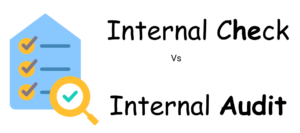Difference between internal check and internal audit

So the major difference between internal check and internal audit is that internal check is a subset of the internal audit. Which also means that the flow of a good company with good internal results would have
- Good internal checks
- Which will lead to good to internal controls
- Finally which ensures good internal audit
Let’s take a simple example;
Let’s say in Amtech auto the Navin is the warehouse manager and wants to order some new parts for a broken machine. Now the question is there can be a bad example of internal check and a good example of internal check;
- Firstly if Navin signs the cheque and orders the material both, then this is a bad example of internal check
- However, if Navin puts up the order while the CFO of the company signs the cheque then this is a good example of internal check.
The reason is there always should be a second person who validates the work of the first person.
Some Simple Examples of Internal Checks
Segregation of Work:
to the example above, the one who handles the finance cannot be the same one who also demands the product
Reconciliation:
Every month the bank reconciliation can be performed by a person who doesn’t directly deposit the cash and chequ
Approval & Validation Systems
There should be a system wherein every work has a process of approval and also validation at the same to ensure correctness of the work.
Asset Security:
Ample security process should be used to ensure that the assets of the company has used enough safe guards to make sure that the assets are secured and safe.
Difference Between Internal Check & Internal Audit
Now let me briefly discuss the basic difference between internal check and internal audit so that you understand how they both are related.
| Sr | Internal Check | Internal Audit | |
| 1 | Scope | Internal check is a set of processes which ensures and prevents fraud in the process. | Internal audit is an independent assurance of a business’s internal controls and processes |
| 2 | Duration | Its an ever evolving process | It is done periodically |
| 3 | System | There are no official statutory benchmarks | Follows statutory procedures and systems |
| 4 | Relation | Good internal checks lead to good internal audit | Internal audits don’t lead to to good internal checks or control |
Advantages of Internal Check
Internal check has several advantages, because its always a means to prevent fraud and errors. Whereas internal audits is basically a tool to assess the internal checks and control. Let me list down the various advantages of internal checks
- Helps in detection of fraud.
- Helps in increasing efficiency
- Increases margins and profits
- Also leads to better audits and compliance
Indian Regulations Related to Internal Audit
So, although Internal audit is not compulsory for each company, however ministry of corporate affairs has issued CARO Rules. CARO applies to all companies except:
- Not-for-profit companies
- Banking Companies
- Insurance Companies
- One Person Companies
- Small Companies (as defined under the Companies Act, 2013)
- To implement CARO, the auditor needs to follow specific reporting requirements as stated in the order. These include:
- Fixed Assets: The auditor needs to verify whether the company has maintained proper records of fixed assets and whether physical verification has been conducted.
- Inventory: The auditor needs to verify whether the company has maintained proper records of inventory and whether there is a system in place to conduct physical verification.
- Loans: The auditor needs to verify whether the company has granted any loans and whether the terms and conditions of the loans are prejudicial to the company’s interests.
- Deposits: The auditor needs to verify whether the company has accepted any deposits and whether it has complied with the rules and regulations of the Companies Act, 2013.
- Internal Financial Controls: The auditor needs to report on the adequacy and operating effectiveness of the company’s internal financial controls.
- Statutory Dues: The auditor needs to verify whether the company has complied with the laws and regulations relating to the payment of statutory dues.
- Related Party Transactions: The auditor needs to verify whether the company has complied with the rules and regulations relating to related party transactions.




